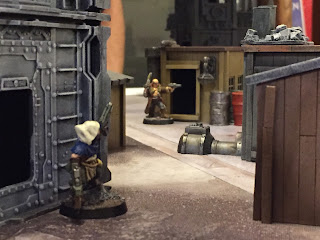Late Spring, Good Food and New Malifaux
Maybe one of these days I will post the recipe for this
delicious BBQ Chicken, but for now I want to talk about the original Malifaux
game. In listening to all of the interviews about Malifaux and the new edition, it
is clear that one of the goals has been to
streamline the game rather than simplify it and to remove the decision fatigue
that could be crippling. To me, this is a welcome concept. One of the things I
both love and hate about Malifaux’s present incarnation is that the game has an
intensely steep learning curve. The complexity and nuance can be staggering for
new players. For me, the problem was that if I didn’t play every single week
and learn all the individual combos and tricks, I quickly fell out of the loop
and it became difficult for me to win a game, or even have much fun. Nuance in
this form is excellent for those players in the know….but is
frustrating for those who aren’t.
I first had an inkling of this problem back around the
launch of book 2 when we started seeing podcasts like Gamer’s Lounge start
focusing on Malifaux. I listened to these podcasts specifically to learn how to
play with particular masters, as simply looking at the cards didn’t always give
me the epiphany of how that card really worked. At the time, I thought of that coverage
as a double-edged sword: I liked being in on the cool tricks and combos, but I
was worried these podcasts were artificially evolving the meta-game,
widening the gap between new players and veterans. I’m somewhere in the middle
of that gap, having read the rules and ‘mali-theoried’ a lot, but not played
very often. As I’ve mentioned before, this is why M2E has sparked my interest acutely.
So what do I like about the new edition?
Accessibility
This really ties into what I’ve already been saying, but the
game seems far more accessible. Aside from playing small games with henchmen
leading crews, you can also now play games with no upgrades, which means that
new players, or players using new factions or crews, don’t have to worry about
needing to know everything. They can add complexity as they choose, starting
with simple models and adding upgrades as they go. If nothing else, this will
help fix a problem I often see in Malifaux….too much Guild. After all, Guild
masters are ‘relatively straightforward.’
Strategies, Schemes and Scheme Markers
The new scheme system has me very interested. I like that I
can try to fool my opponent by dropping scheme markers wherever I like and I
like that I can tease out what my opponent’s schemes are by watching what he
does very carefully. My problem has always been that I don’t play to the
objective, which is critically important . It will continue to be key, but now
I will have a little pile of scheme markers sitting on my side of the table reminding
me what I should be doing. Oh, and that
means I get to make cool scheme markers.
Triggers are Important
When I first heard about M2E and all the changes to the
rules, I had the immediate reaction that ‘soulstones have been nerfed.’ I was
worried the changes would do away with that climatic activation of a master
that turns the tide of a game. For me, that was always something like Seamus
focusing a flintlock shot on an opponent and burning stones until there was nothing
the opponent could do except put the model away. In reality, the change in soulstone rules
doesn’t prevent these momentous activations. Instead, it makes triggers the
catalyst for these moments. This seems particularly the case in games with few
or no upgrades. Fewer upgrades means fewer tricks and that means the tricks you
have are more important.
So those are my initial impressions. Of course, there is
still a lot to learn. As always, comments are always welcome, so let me know
where you may have a different opinion than mine.
More to Come.
-Nick





Comments
Post a Comment